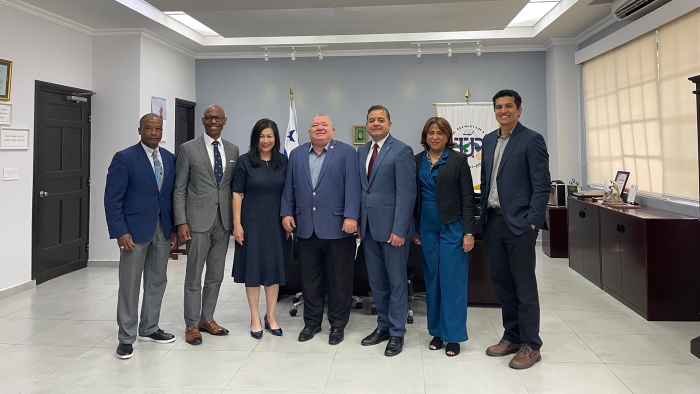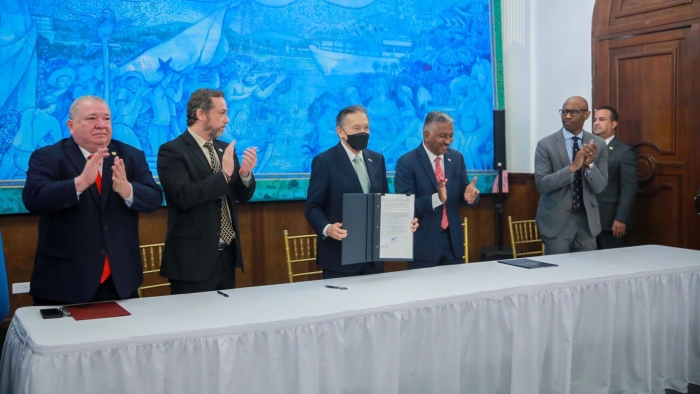
Eduardo Ortega Barría (left), Panamanian national secretary of science, technology and innovation, and Chris Howard (center), executive vice president and chief operating officer of Arizona State University, sign an agreement between Arizona State University and the Panamanian government to assist in the country’s microelectronics workforce development with Cecilia Mata (right), chair of the Arizona Board of Regents, as witness. Photo courtesy Dario Solis
By TJ Triolo |
May 15, 2024
ShareFacebookTwitterLinkedInEmail
Arizona State University continues to expand its efforts to support the development of the semiconductor workforce and supply chain on a global scale.
On April 30, Panamanian President Laurentino Cortizo Cohen held a ceremony in which he announced an executive decree formalizing the country’s intention to boost its microelectronics industry.
The ceremony included the announcement of an academic collaboration between ASU and the country of Panama that will begin with a scholarship program administered by the university and the Panamanian Human Resource Development Agency IFARHU and SENACYT, the Panamanian equivalent of a combination of the U.S. National Science Foundation and National Institutes of Health. Through the agreement, Panamanian students will be eligible to apply to ASU’s semiconductor industry-relevant bachelor’s, master’s and doctoral degree programs, as well as graduate and professional certificates.
Students will also hone their language skills through programs in English, including specialized instruction for the semiconductor industry. In addition, faculty members from Universidad Tecnológica de Panamá, or UTP, and the Instituto Técnico Superior Especializado, or ITSE, will be prime candidates for programs taught at ASU, in Panama and remotely that improve their instructional skills.
The agreement marks the culmination of two years of relationship-building with Panamanian institutions led by Dario Solis, business development director of innovation technology partnerships in the Ira A. Fulton Schools of Engineering at ASU, in conjunction with the Fulton Schools Global Outreach and Extended Education team.
Solis coordinated with Cecilia Mata, chair of the Arizona Board of Regents, or ABOR, and Clarence McAllister, founder and CEO of Fortis Engineers and an ASU alumnus, who are both originally from Panama and used their connections in the country to help facilitate the agreement. Chris Howard, ASU executive vice president and chief operating officer, signed the agreement with IFARHU and SENACYT leadership.
“I’m thrilled to see the results of an extensive relationship-building mission come to fruition,” Solis says. “This wouldn’t have been possible without continuous and consistent involvement from my colleagues in ABOR, Fortis and ASU, as well as my Panamanian collaborators in the office of the Panamanian president; the Ministry of Commerce and Industry; the National Secretariat of Science, Technology and Innovation; and UTP.”
Kyle Squires, ASU’s senior vice provost of engineering, computing and technology and dean of the Fulton Schools, praised the collaboration as an important step in the university’s international outreach.
“ASU is a global university with connections all over the world, and we view Panama as a crucial partner in assisting with the renaissance of the American semiconductor industry,” Squires says. “This partnership will benefit both Panama and the U.S. as we learn from each other, capitalize on our synergistic strengths, and build up the Panamanian semiconductor workforce.”

Through the program, the collaborators aim to train 500 engineers and technicians over the next five years.
One of the program’s emphases is ensuring the needs of industry are met. The collaborators aim to set Panama’s semiconductor workforce up for success to tackle the challenges of modern microelectronics research, development, education and manufacturing to sustain the country’s electronics ecosystem for the long term.
During the program’s initial period through 2029, ASU and UTP intend to create a framework for collaboration in semiconductor research and education that extends well after the program is over. By the end of the five years, the initiative also aims to align Panamanian semiconductor education with global standards, increase engagement and investment from the private sector and create an environment to ensure the country’s microelectronics industry is innovative and competitive in the global marketplace.
Further scholarship opportunities are in the works as part of the initiative, as well as for students in semiconductor-related majors to learn English and obtain graduate certificates in semiconductor processing through online learning delivery methods.
To improve Panama’s research capacity, UTP is also launching a Center for Advanced Technology in Semiconductors.
After attending the ceremony announcing the agreement, Howard left optimistic about the possibilities the partnership holds for the future.
“It benefits both ASU and our academic collaborators to build others up and share our knowledge,” Howard says. “The more strong institutions we have relationships with around the world, the more we can deliver innovation that matters.”
Mata also looks forward to the benefits the collaboration can have for the world.

“I’m proud that Arizona State University is stepping up to help Panama make our global microelectronics supply chain stronger,” Mata says. “A resilient semiconductor industry takes a worldwide effort, and I look forward to building up a mutually beneficial collaboration between my homeland of Panama and ASU.”
The rise of ASU’s semiconductor industry involvement is a response to the events of 2020, when the COVID-19 pandemic brought the world’s microelectronics supply chain to a halt. The supply chain issues caused bottlenecks in industries dependent on a small number of sources for most of the world’s semiconductor chips.
The U.S. government reacted with a bipartisan effort to create the CHIPS and Science Act in 2022, which resulted in more than $50 billion in funding to strengthen and diversify the global semiconductor supply chain.
The International Technology Security and Innovation Fund, or ITSI Fund, is part of the CHIPS and Science Act funding and aims to strengthen the U.S. semiconductor supply chain through partnerships with five countries: Vietnam, the Philippines, Costa Rica, Indonesia and Panama. ASU entered into a $13.8 million agreement with the U.S. Department of State to take part in the initiative, which Ramin Toloui, assistant secretary of the Bureau of Economic and Business Affairs in the U.S. Department of State, kicked off on ASU’s campus in March.
ASU’s newly announced collaboration with the Panamanian government to enhance their semiconductor industry is the latest effort in alignment with the ITSI Fund’s purpose.
Microelectronics SDG 04 Quality Education Staff Faculty Policymakers Science and technology International Ira A. Fulton Schools of Engineering Arizona Board of Regents

